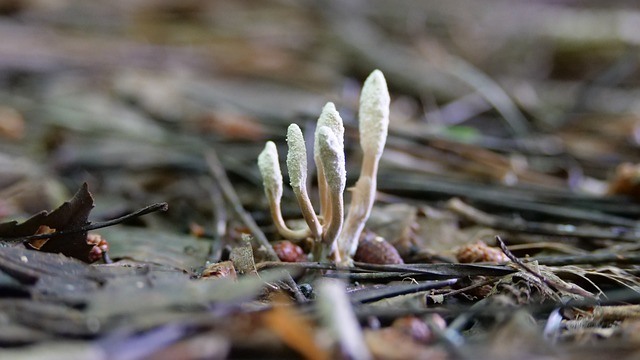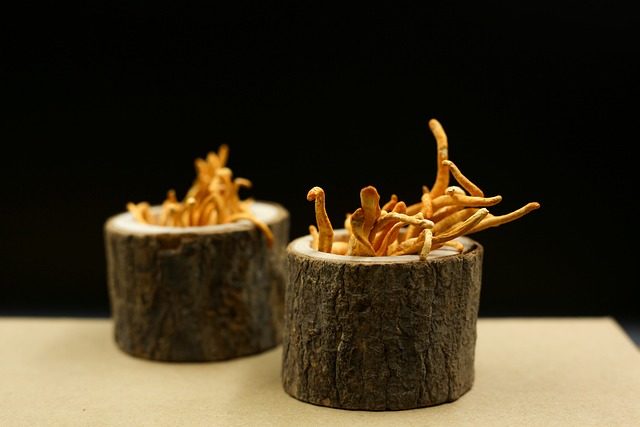Have you ever heard of a fungus that could potentially improve your exercise performance, support heart health, and even possess anti-tumor properties? Well, meet Cordyceps, a unique parasitic fungus that has been used in traditional Chinese medicine for centuries. Today, it is gaining popularity worldwide for its potential health benefits. Let’s dive into the fascinating world of Cordyceps and discover what this incredible fungus has to offer.
Table of Contents
Short Summary
Cordyceps species are widely cultivated and have potential health benefits backed by research, such as exercise performance enhancement, antioxidant properties, tumor prevention and heart health promotion.
Safety precautions should be taken when consuming Cordyceps supplements due to possible interactions with medications or specific populations.
It is important to select quality certified organic Cordyceps products for daily consumption in order to reap its potential health benefits.
Cordyceps: A Comprehensive Overview

Cordyceps is a parasitic fungus consisting of over 400 species that typically infect insects and arthropods, with each species targeting a particular host. Used for centuries in traditional Chinese medicine, cordyceps has attracted modern research attention for its potential health benefits.
Two species, Cordyceps sinensis and Cordyceps militaris, have been the focus of most studies, exploring their possible applications in various health concerns.
Cordyceps Species
Cordyceps sinensis, known for infecting the caterpillar of the Hepialus moth, is primarily found at high elevations in Tibet and Chinese provinces such as Sichuan, Yunnan, Qinghai, and Gansu. On the other hand, Cordyceps militaris, also known as Scarlet Club Fungus or Caterpillar Killer, can be commercially cultivated to produce its mushroom (fruiting body) and is typically found in North America and Asia, often in mountains and bogs.
An important distinction to note is the difference between wild Cordyceps sinensis and cultivated Cordyceps Cs-4. Developed in the 1980s by Chinese scientists attempting to cultivate Cordyceps sinensis, Cs-4 is a mycelium culture that does not produce a mushroom (fruiting body) like its wild counterpart. True Cordyceps mushroom extract can be manufactured using Cordyceps militaris, which can be commercially cultivated in large quantities with relative ease.
Traditional Uses
Cordyceps mushrooms hold great importance in traditional Chinese medicine, where they were offered to the Emperor’s court and Chinese nobility. The first written record dates back to AD 620. Historically, Cordyceps was used as a lung and kidney tonic, making it beneficial for respiratory issues, physical exhaustion, and individuals with a fragile constitution.
Additionally, it was traditionally used to enhance sexual function, libido, and performance. The consumption of Cordyceps supplements may aid the body in utilizing oxygen more efficiently and enhancing blood flow, both essential for physical health and sexual function.
Other benefits, such as enhanced endurance, increased energy, and reduced inflammation, may also impact fertility and libido.
Health Benefits Backed by Research

Cordyceps has shown promise in various areas of health, including exercise performance enhancement, antioxidant properties, potential anti-tumor effects, diabetes management, and heart health promotion.
However, it is essential to note that more human studies are needed to confirm these benefits.
Let’s explore these potential health benefits in more detail.
Exercise Performance Enhancement
Cordyceps has been observed to enhance athletic performance by improving physical abilities, endurance, and stamina, partially attributed to the increase in ATP, one of the primary sources of energy during exercise. Additionally, cordyceps may promote healthy levels of androgens in men and support the healthy functioning of the steroidogenic acute regulatory (STAR) enzyme, responsible for allowing cholesterol to enter the mitochondria for the production of steroid hormones.
Research has demonstrated that cordyceps can enhance measures of exercise performance in both older and younger adults. However, a study with young, healthy male adults supplementing with 2.4g/day of cordyceps showed no significant enhancement in physical endurance or testosterone levels.
Interestingly, a combination of Cordyceps and reishi mushroom supplementation resulted in a decrease in overtraining markers and promotion of a healthy testosterone-to-cortisol ratio.
Antioxidant Properties

Cordyceps is believed to possess potent antioxidant properties due to its high content of polysaccharides and cordycepin, which are reported to augment the levels of antioxidant enzymes such as superoxide dismutase and glutathione.
These antioxidant properties may assist in combating free radical damage, inhibiting oxidative stress, and potentially delaying the signs of aging.
Potential Anti-Tumor Effects
Cordyceps has been suggested to act as a natural cancer treatment in certain cases, inhibiting the growth of tumors and cancer cells. In animal studies, Cordyceps reversed the leukopenia caused by radiation and Taxol treatments, a commonly used chemotherapy drug.
However, the effects of Cordyceps on leukopenia and tumor growth in humans are unknown, and more research is needed to confirm these potential benefits.
It is essential to clarify that while test-tube and animal studies indicate potential anti-tumor effects of Cordyceps, these effects have yet to be demonstrated in humans. Further research is necessary to determine the efficacy of Cordyceps as a cancer treatment and its potential to alleviate side effects of cancer treatments.
For more info, visit Cordyceps militaris Exerts Antitumor Effect on Carboplatin …
Diabetes Management

Cordyceps may have beneficial effects on diabetes management, including the regulation of blood sugar levels and the treatment of diabetic kidney disease.
No randomized clinical trial data exists to suggest that cordyceps can help with blood sugar balance. Therefore, its ability to do so remains unproven. Consult your healthcare provider if you are taking insulin or any other medication that reduces your blood sugar level, as cordyceps can also reduce blood sugar levels.
Heart Health Promotion
Cordyceps may offer protection against heart damage and reduce cholesterol levels to reduce the risk of coronary heart disease. Lower cholesterol levels can assist in preventing arteriosclerosis, a condition characterized by the accumulation of plaque in the arteries and an augmented risk of heart attack and stroke.
However, insufficient evidence is available to ascertain whether cordyceps is beneficial for heart health in humans.
Safety and Side Effects
Cordyceps is generally safe for short-term use, with mild potential side effects reported. However, pregnant or breastfeeding women should avoid supplementation, and those with autoimmune diseases or blood clot disorders should consult a physician before taking them.
Let’s discuss the common side effects and precautions for specific populations in more detail.
Common Side Effects
Cordyceps is generally considered safe for short-term use, with mild potential side effects being reported, such as stomach discomfort, nausea, and dry mouth.
However, it is crucial to discontinue use and consult your healthcare provider should any unusual symptoms or side effects occur after consuming Cordyceps.
Precautions for Specific Populations
Pregnant or breastfeeding women should avoid Cordyceps supplementation, and those with autoimmune diseases or blood clot disorders should seek medical advice before taking them.
Additionally, it is recommended to discontinue the use of Cordyceps two weeks before surgery due to potential interactions with medications.
Cordyceps Interactions with Medications
Cordyceps may interact with certain medications, making it essential to review supplement labels with healthcare providers. Although no known severe or serious interactions have been reported, Cordyceps has moderate interactions with at least 72 distinct medications.
Consult your healthcare provider if you are taking insulin or any other medication that reduces your blood sugar level, as cordyceps can also reduce blood sugar levels.
Dosage and Consumption
Limited human research is available on cordyceps dosage. However, most studies in humans have employed 1,000–3,000 milligrams per day, which is deemed safe and effective.
Let’s explore the different forms of Cordyceps supplements and dosage recommendations in more detail.
Forms of Cordyceps Supplements
Cordyceps supplements are available in a variety of forms, including capsules, powders, extracts, and teas. Selecting the appropriate form depends on personal preference and ease of consumption, but it’s essential to consult your healthcare provider for guidance on selecting the appropriate supplement and dosage for your individual needs.
Dosage Recommendations
While the recommended dosage for cordyceps supplements is generally between 1,000-3,000 milligrams per day, some sources indicate a range of 3-6 grams per day.
It is imperative to adhere to the precise dosage instructions on the product label and consult your healthcare provider to ensure that the appropriate amount of cordyceps is taken for your individual needs.
Selecting Quality Cordyceps Supplements
When selecting Cordyceps supplements, it is recommended to choose products that are extracted from the mushroom (fruiting body). It is also beneficial to ensure they are certified organic and contain measured levels of beta-glucans. Choose brands that have the United States Pharmacopeia (USP) or NSF International (NSF) seal to be sure you are buying high quality Cordyceps supplements. These seals provide assurance of quality and compliance with all necessary standards.
Consult your healthcare provider for further guidance on selecting the appropriate supplements.
Incorporating Cordyceps into Your Diet
In addition to supplements, you can incorporate cordyceps into your daily diet through various recipes. Cordyceps extract powder may be added to smoothies, stews, coffee, stir-frys, and other meals and drinks, providing a convenient and versatile way to enjoy the potential health benefits of this fascinating fungus.
Summary
In conclusion, Cordyceps is a unique parasitic fungus that has been used in traditional Chinese medicine for centuries and has piqued the interest of modern researchers for its potential health benefits. While more human studies are needed to confirm some of these benefits, Cordyceps has shown promise in areas such as exercise performance enhancement, antioxidant properties, potential anti-tumor effects, diabetes management, and heart health promotion. As with any supplement, it is crucial to consult with a healthcare provider before incorporating Cordyceps into your daily routine to ensure safety and suitability for your individual needs. So why not explore the world of Cordyceps and see if this fascinating fungus could be the key to unlocking your health potential?
Frequently Asked Questions
What does cordyceps do to humans?
Cordyceps does not directly affect humans, however its effects are nonetheless felt by us. Through the infection of insects, cordyceps is able to control the host’s behavior and migrate them to a humid climate which is perfect for its growth.
Consequently, this alters the food web balance, with potentially harmful consequences for human food supply.
Are cordyceps safe for humans?
Overall, cordyceps is generally considered safe for human consumption, with some mild side effects such as stomach discomfort, nausea and dry mouth reported. People who have certain medical conditions should be cautious when consuming cordyceps, as it can activate the immune system. People with cancer, diabetes, bleeding disorders, pregnant or breastfeeding women and children should avoid consuming Cordyceps mushrooms and supplements. Mar 4, 2023.
In general, Cordyceps mushrooms and supplements are safe to consume for most people. However, individuals with medical conditions such as cancer, diabetes, and bleeding disorders should take extra caution. Pregnant women, breastfeeding mothers and children should also not consume cordyceps in order to avoid potential negative effects. Mar 12, 2023.
Overall, cordyceps are generally safe for humans, however it is important to note that there may be potential adverse reactions or risks associated with its consumption. People with certain medical conditions, as well as pregnant women, breastfeeding mothers and children, should avoid consuming cordyceps in order to minimize potential risk. Apr 8, 2023.
Generally, Cordyceps mushrooms and supplements are considered safe for human consumption, although certain people with medical conditions, pregnant or breastfeeding women, and children should avoid using them. Possible side effects may include stomach discomfort, nausea and dry mouth. May 6, 2023.
In general, cordyceps are considered safe for human consumption, although those with certain medical conditions, pregnant women, breastfeeding mothers and children should avoid taking it as it may cause adverse effects. Mild side effects such as stomach upset, nausea and dry mouth may occur in some individuals. Jun 10, 2023.
Overall, Cordyceps mushrooms and supplements are usually safe for human consumption. However, individuals with certain medical conditions, pregnant or breastfeeding women, and children should take extra caution when considering Cordyceps use, as it may cause negative side effects and potentially activate the immune system. Jul 3, 2023.
In general, Cordyceps mushrooms and supplements are believed to be safe for human consumption. Potential side effects could include stomach discomfort, nausea, and dry mouth. Additionally, people with certain medical conditions, pregnant or breastfeeding women, and children should avoid consuming cordyceps to reduce the risk of adverse reactions. Aug 7, 2023.
Overall, Cordyceps mushrooms and supplements are usually safe for human consumption, although people with certain medical conditions, pregnant women, breastfeeding mothers, and children should avoid using them. While the risk of adverse reactions is low, mild side effects such as stomach discomfort, nausea and dry mouth may occur. Sep 9, 2023.
In general, Cordyceps is considered safe for human consumption, but those with certain medical conditions, pregnant or breastfeeding women, and children should take extra caution due to possible adverse effects. Some mild side effects such as stomach discomfort, nausea and dry mouth have been reported. Oct 14, 2023.
Overall, cordyceps are generally safe for humans, but it is important to be aware of potential side effects or risks associated with its consumption. People with certain medical conditions, as well as pregnant women, breastfeeding mothers and children should avoid consuming Cordyceps mushrooms and supplements to minimize potential risk. Nov 11, 2023.
Generally, Cordyceps mushrooms and supplements are believed to be safe for human consumption, though people with certain medical conditions, pregnant or breastfeeding women, and children should take extra caution due to the possibility of adverse reactions. Mild side effects such as stomach discomfort, nausea, and dry mouth may also occur. Dec 16, 2023.
Overall, Cordyceps mushrooms and supplements are generally considered safe for humans, however people with certain medical conditions, pregnant women, breastfeeding mothers and children should exercise caution when consuming these products as they may cause adverse reactions. Mild side effects such as stomach discomfort, nausea, and dry mouth have been reported. Jan 21, 2024.
Is cordyceps a fungus or parasite?
Cordyceps is a genus of fungi, many of which are parasites and have evolved to infect arthropods. They reproduce by growing their mycelium out of the host’s body, thus replacing some of the host’s tissue.
As such, Cordyceps can be classified as both fungi and parasites.
Can cordyceps infect humans?
Overall, it is unlikely that cordyceps can infect humans. Research shows that the fungus is only harmful to arthropods and there is no evidence that it has evolved to have an effect on human hosts. Thus, humans should not worry about being infected by this fungus.
Overall, research suggests that cordyceps are not capable of infecting humans and pose no threat to our species. The fungus has been found to be harmful only to arthropods, making it highly unlikely that it would ever evolve to affect humans.









